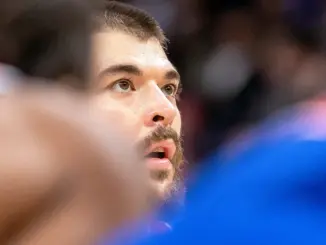Watching This NBA Finals… I’m Convinced the Celtics Would Have Destroyed Either Team If They Hadn’t Squandered That Semifinal Game
As I sit and watch this NBA Finals unfold, I can’t help but feel a deep sense of frustration—borderline disbelief—thinking about what could have been. No disrespect to either team competing in the Finals this year, but watching them go head-to-head has only strengthened a belief I’ve been trying to push aside since that heartbreaking Game 7 loss: the Boston Celtics would have destroyed either of them if they hadn’t completely squandered away their opportunity in the semifinals.
It’s not just fan bias. It’s not just heartbreak talking. It’s the plain truth when you look at the matchup potential, the roster depth, and the way Boston had been peaking at the right time—until they weren’t.
Let’s start with the talent. The Celtics arguably had one of the most complete rosters in the league this season. Between Jayson Tatum and Jaylen Brown, you had two All-NBA caliber wings capable of scoring at all three levels, defending multiple positions, and handling the ball under pressure. Add in Derrick White’s two-way play, Jrue Holiday’s leadership and lockdown defense, and Kristaps Porziņģis’s ability to stretch the floor and protect the rim, and you had a team built to adapt to almost any style of play.
Compare that to what we’re watching in the Finals. One team is clearly banged up, running thin on depth, leaning heavily on a couple of star performances to keep games close. The other squad has grit and hustle, no doubt, but they’re inconsistent and lack the kind of elite shot creation and defensive versatility that the Celtics brought to the table. Boston would have eaten this matchup alive.
But of course, none of that matters now—because when it mattered most, in that crucial semifinal game, they couldn’t pull it together.
And let’s be honest here: that wasn’t a case of being outclassed or outcoached. That was a self-inflicted collapse. Turnovers. Cold shooting stretches. Defensive lapses. Boston beat Boston. The Celtics had that series in the palm of their hands and let it slip away.
There’s a kind of loss that sticks with you—not because you got blown out or because the other team was clearly better, but because you know in your gut that you were the better team and just didn’t show up when it counted. That’s what this feels like. That’s what watching these Finals feels like.
There’s nothing more painful for a fan than the “what if” game, but how can you not play it when you see the opportunity that was left on the table? What if Tatum didn’t twist his ankle early in that series? What if Joe Mazzulla had made adjustments just a few possessions sooner? What if the bench had stepped up for just one more quarter of competent play?
And yet, what hurts even more is that these Celtics were built for this exact stage. They had gone through their growing pains. Tatum and Brown had tasted Conference Finals heartbreak before. They had the battle scars, the postseason experience, and the roster cohesion. This wasn’t supposed to be a “learning year.” This was the year they were supposed to win.
It’s particularly frustrating when you think about the Celtics’ ability to dictate tempo. The teams in the Finals this year thrive on rhythm—one thrives on transition and energy, the other on half-court execution. Boston was one of the few teams in the league that could force either to play uncomfortable basketball. They had the switch-heavy defense to disrupt rhythm offenses, and the shooting to stretch out half-court sets. Against either Finals team, the Celtics would have had the upper hand in pace, physicality, and depth.
And let’s not forget: Boston had the best net rating in the league for a reason. They didn’t just beat teams—they dominated them, particularly over the second half of the season. When healthy, they moved the ball with surgical precision, played suffocating defense, and hit threes at a clip that demoralized opponents. They didn’t rely on just one or two players carrying the load; they played as a unit, with multiple weapons on both ends of the court.
That semifinal loss was not indicative of who the Celtics were. It was an outlier performance at the worst possible time. And unfortunately, in the playoffs, there’s no margin for those kinds of nights.
So here we are, watching two teams battle for a title, knowing deep down that the true best team in the NBA is sitting at home. That doesn’t take anything away from the Finals participants—they earned their spot, and they’re competing with heart. But from a basketball perspective, it’s hard not to feel that the championship race lost some of its luster the moment the Celtics were eliminated.
You never want to be “that fan” who claims their team would’ve won it all if only things had gone slightly differently. But this isn’t that. This isn’t hypothetical fantasy. This is a clear-eyed evaluation of a team that had all the pieces, all the talent, all the momentum—and just blew it in the wrong moment.
And now, instead of celebrating what could have been a banner-raising season, Celtics fans are stuck watching from the sidelines, thinking about what might have been.
But if there’s a silver lining, it’s this: that loss will fuel them. The core is still young. The team is still stacked. The hunger will only grow. And next time, hopefully, they won’t let the opportunity slip away.
Let me know if you’d like a version tailored for a blog, newsletter, or social media post!


Be the first to comment